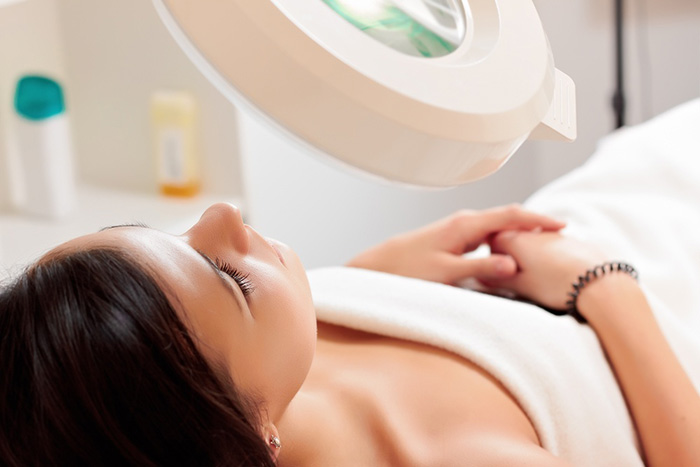Youthful skin is often mentioned as an ideal to aim for when taking care of your skin, and with good reason. The skin of babies and children is soft, supple and wrinkle-free. Although skin problems such as spots and acne often plague many teenagers, its generally true that young skin is the best skin.

Cosmetic dermatology offers a range of procedures to improve your skin
As we age, exposure to the environment, our behaviour and injury can cause skin damage and premature ageing. It can even increase the risk of developing skin cancer.
What can be done?
At The Devonshire Clinic, we recognise skin damage, ageing, and skin cancer as part of the same process but all at different points on a spectrum. Adopting a lifestyle to protect your skin from cancer will also delay some of the signs of ageing.
UV skin damage
One of the most damaging environmental factors for the skin is Ultraviolet Radiation (UVR) present in sunlight. UVB light is damaging to the epidermis but UVA light is worse because it penetrates deeper into the skin, reaching the dermis.
Some exposure to sunlight is good because it stimulates the skin to produce vitamin D. However, staying in the sun until the skin becomes burned or tans is dangerous. People are particularly at risk of sun damage if their skin is very pale, they have red hair or they have a lot of freckles or moles.
Sunbeds are particularly damaging to the skin and are now banned in the UK for children and teenagers up to the age of 18. Having regular sunbed sessions before you are 35 can increase your risk of skin cancer by 75%.
Staying safe in the sun not only reduces your skin cancer risk, it can lessen the chances of premature skin ageing:
- Keep out of the sun between 11 am and 3 pm
- Wear protective clothing – hat, long sleeves, sunglasses and sun visor
- Use high factor sun screen (30+ minimum, greater factors for children)
- Apply a good moisturiser, emollient lotion or after sun lotion to prevent dry patches
UV exposure and skin ageing
Even if UV exposure does not cause the sustained damage that leads to cancerous changes, it disturbs the structure of the skin:
- UVA light that reaches the dermis destroys collagen fibres
- The body responds by producing more of a protein called elastin
- Enzymes that act to rebuild collagen fibres don’t work properly
- The skin’s structure changes, becoming leather-like, thinner and wrinkled
- Areas of strongly pigmented skin can appear (age spots, or liver spots as they are commonly known)
- Sun damaged skin, sustained from years of repeated sunbathing and tanning is more prone to developing pre-cancerous changes, known as actinic keratoses.
Delaying or reversing skin ageing
Although ageing is inevitable, some of the worst signs of skin ageing can be prevented by good lifestyle choices related to sun and UV light exposure.
It is also possible to have a range of treatments that improve the look of ageing skin, giving it the appearance and texture of younger skin.
At The Devonshire Clinic, we can advise you about taking care of your skin, we can screen for skin cancer and pre-cancerous changes, we can diagnose and treat skin cancers and we also offer a range of anti-ageing skin treatments:
- Chemical peels
- Lasers
- IPL
- Dermal fillers
- Botulinum toxin injections (Botox)
- Platelet Rich Plasma injections (PRP)
- Cosmeceuticals
- Microdermabrasion